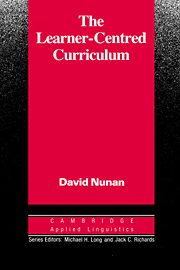Book contents
- Frontmatter
- Contents
- Series Editors' Preface
- Preface
- 1 Introduction
- 2 Curriculum Processes
- 3 Learner-Centred Curriculum Development
- 4 Pre-Course Planning Procedures
- 5 Planning Content
- 6 Methodology
- 7 Resources for a Learner-Centred Curriculum
- 8 Assessment and Evaluation
- 9 Evaluation and Professional Development
- 10 The Teacher as Curriculum Developer
- References
- Appendix
- Subject Index
- Author Index
- Frontmatter
- Contents
- Series Editors' Preface
- Preface
- 1 Introduction
- 2 Curriculum Processes
- 3 Learner-Centred Curriculum Development
- 4 Pre-Course Planning Procedures
- 5 Planning Content
- 6 Methodology
- 7 Resources for a Learner-Centred Curriculum
- 8 Assessment and Evaluation
- 9 Evaluation and Professional Development
- 10 The Teacher as Curriculum Developer
- References
- Appendix
- Subject Index
- Author Index
Summary
Preamble
Traditionally ‘curriculum’ is taken to refer to a statement or statements of intent – the ‘what should be’ of a course of study. In this work a rather different perspective is taken. The curriculum is seen in terms of what teachers actually do; that is, in terms of ‘what is’, rather than ‘what should be’. The work is thus based on what many language teachers have found both desirable and possible.
The curriculum is seen from the perspective of the teacher for two reasons. In the first place, in the sort of learner centred system towards which many language teaching organisations are moving, the teacher is the prime agent of curriculum development. Second, educational reality is not what educational planners say ought to happen, but what teachers and learners actually do. The notion that planning equals teaching and that teaching equals learning is naive. Research suggests that the equation is much more complex than this, that teachers do not slavishly follow a pre-specified plan, and that learners do not necessarily always learn what teachers teach (Allwright 1986; Burton and Nunan 1986). It is this insight which has prompted within these pages a rather different view of language curricula.
Linguistics and Language Teaching
Due to a series of events which are partly circumstantial and partly historical, much of the development in language teaching has occurred outside the educational mainstream. The assumption seems to have been that educational theory and research has very little to contribute to the field of language teaching.
- Type
- Chapter
- Information
- The Learner-Centred CurriculumA Study in Second Language Teaching, pp. 1 - 9Publisher: Cambridge University PressPrint publication year: 1988



